Text
- Post 10: Final Thoughts and Questions -
After watching the entire movie, reading some criticisms and analyses of both the novel and the film, and creating these blog posts, I have a couple of comments and questions that I was left with that I wanted to share!
I thoroughly enjoyed watching this movie and found myself crying many times over the heartbreaking challenges that each character faced, as well as celebrating the triumphs that many of them made.
As a woman I related a lot to the pressures of finding the right relationships and defending myself from societal expectations of my gender that would harm me. I wondered how different my ability to be outspoken about these problems would be if I were Asian like the characters in Joy Luck Club. Would I be supported by my family in this way of thinking if I had grown up in a family with traditional Asian beliefs and values?
I also wondered how viewers of Asian backgrounds felt about the film, because I did see some criticism of Amy Tan's writing and how some people felt it enforced some Asian stereotypes. I'm curious to know if those opinions have changed since the movie's debut in 1993, especially now in the context of the Asian Anti-Hate movement that has gained visibility in the last few years.
My last question that I'll leave you with is this: how does this film contribute to the conversation on immigration in the United States for you personally? For me, I found that some of the issues these mother-daughter pairs faced were very relatable to me! I would hope that anyone who watches this film that has a negative opinion of immigrants of any kind would find something to relate to in these characters, so that they might find some empathy in the overall immigrant experience.
That's all from me. I hope you enjoyed reading my thoughts and descriptions, and that you will watch the movie if you haven't already!

2 notes
·
View notes
Text
- Post 9: Identity and Belonging -
Each of the four mothers share their desire for their daughters to belong in American society at some point throughout the film. This concept is found often in works of film or literature that talk about immigrant experiences in America.
The opening monologue of the film was really beautiful, and I thought it was a great way of introducing the theme of belonging to the movie. As Suyuan tells the story of the woman and her swan, she mentions that the woman brags to the swan that her daughter will be valued in American society because she will speak perfect English.
Both Suyuan and Lindo push their daughters into conquering prestigious activities like piano and chess because they want them to be accomplished at a young age. They hope that by showing their intelligence and skill as soon as possible, they will be offered more opportunities for success in the future. Without their intelligence, the mothers fear that June and Waverly will be passed over and unappreciated by American society. This is because they themselves were raised to believe that outside of their roles as daughters, wives, and eventual mothers, they had no use. They sought to challenge June and Waverly to prove their usefullness in other ways, unaware of the strain it put on them all.
Even Rose is confronted with her belonging in American society as a Chinese-American when she is insulted by Ted's mother in their very first conversation together. She already feels out of place because of the higher-class atmosphere that she has found herself in, but she does not initially consider her identity as an Asian woman to be any cause for concern. It isn't until Ted's mother tells her to leave Ted before she embarasses him for marrying a "foreigner" that Rose feels the need to conform and minimize her Asianness in order to belong.
The very reason that these women came together in the first place - to play mah jong together as a little community - speaks to the value of belonging and feeling included. Suyuan formed this group with Lindo, Ying Ying, and An Mei in order to provide somewhere they could all feel important. Whereas mah jong is usually competitive and alienating to the players who do not win, these four women changed the atmosphere to mean that everyone walked away from the table having gained something - be it money from winning the game, or emotional support and validation after sharing stories and experiences with each other.
Each of them had an impact on the group, and when any of them was absent, they were greatly missed. Ben Xu expertly summarizes the sense of belonging that lives within their mah jong games by stating, "...the San Francisco Joy Luck Club aunties reformulate their mah jong game so that it becomes, symbolically at least, a game with no losers" (Xu, 9).
This would have come as a consolation to the four women who were likely to have faced persecution and prejudice outside of their Asian communities. The Joy Luck Club provided them with inclusion and a place to be wanted.
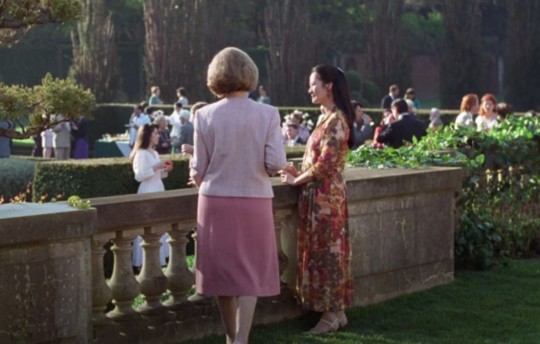
1 note
·
View note
Text
- Post 8: Gender -
The concept of femininity and traditional gender roles in Chinese culture are heavily explored in the Joy Luck Club through both the mother's experiences in China and the daughter's experiences being raised by Chinese immigrants.
June, Waverly, Lena, and Rose all have a mother-daughter conflict in common: they feel overly pressured by their mothers to be successful and be good daughters and wives.
This sentiment is commonly expressed by daughters of immigrant parents, but is especially felt by daughters of Asian immigrants. Because of the strong contrast in American culture, in which feminism has become more mainstream, and several Asian cultures, where women are more often expected to be subservient, it's often found that Asian-American women struggle with their identity as a woman that belongs in both spheres.
In her article on gender and society, Esther Ngan-Ling Chow writes, "...the Asian family is characterized by a hierarchy of authority based on sex, age, and generation, with young women at the lowest level, subordinate to father-husband-brother-son" (Chow, 286).
Because of this conflict we see how the traditions that Suyuan, Lindo, Ying Ying, and An Mei were raised to follow have played a heavy part in how they raise their own daughters, either following those traditions and passing them onto their daughters in Suyuan and Lindo's case, or by ending the cycle and empowering their daughters like Ying Ying and An Mei.
It is also made clear that because of their gender, the women in the story have a more difficult time entering the American mainstream than they would if they were men. An example of this that comes to mind is Harold, Lena's ex-husband. She comments on the fact that they both work for the same company and have the same qualifications, and yet Harold holds a higher position and is paid much more than Lena is. Both Harold and Lena come from Chinese immigrant parents, but because Harold is a man, he is able to climb the corporate ladder faster than Lena.
"I tell you the story because I was raised the Chinese way. I was taught to desire nothing, to swallow other people's misery, and to eat my own bitterness. And even though I taught my daughter the opposite, still she came out the same way. Maybe it is because she was born to me and she was born a girl, and I was born to my mother and I was born a girl. All of us like stairs, one step after another, going up, going down, but always going the same way." - An Mei
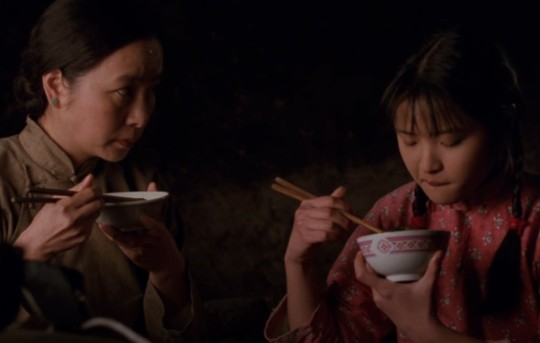
1 note
·
View note
Text
- Post 7: Migration -
The settings of The Joy Luck Club hold a lot of importance to the film and the group of immigrants that it represents. The contrast between the lives the mothers lived in China and the lives their daughters live in the United States is amplified by the events that take place in both countries.
San Francisco has a large Chinese-American population, and has been the starting point of hundreds of thousands of Chinese immigrants who come to the United States for a new life.
Amy Tan, author of The Joy Luck Club, was one of the many children born to Chinese immigrant parents that grew up in San Francisco.
The movie demonstrates several different reasons that were common for Chinese women to leave their home country.
In Suyuan's case, war and disease forced her to initially leave her home town before eventually moving to the United States to escape the horrors of the Second World War.
Lindo was an example of the practice of child marriages that was common at the time in China, and the damage it dealt to many boys and girls her age. After her lucky escape, she decided to move to the United States where she could not be forced to marry ever again.
Ying Ying came to the United States to escape her abusive ex-husband and the trauma she faced after losing her child. She sought the opportunity to heal from the past somewhere far away from the place they occured, and chose America as her best opportunity.
An Mei also wishes to leave behind the cruelty she experienced in China, and she knows that if she moves to America she will be able to teach her future daughters to live for themselves as individuals, and not as an asset for the men who would control them in China. This search for gender equality is a common motivator for women in other countries who immigrate to the United States.
Through these four women's stories a common theme on migration is developed. We learn the reasoning behind each of their decisions to leave China, whether it be by force or by choice. Author Ben Xu describes the dichotomy between the motivations for their escape, writing, "All the Club aunties have experienced two kinds of extreme situations: one kind is famine, war, forced marriage, and a broken family in China, and the other is a cultural alienation, disintegration of old family structure, and conflict between mother and daughter in America" (Xu, 5). Not only are the storylines in the film indicitive of migration in a literal sense, but they also represent the migration of the four mothers in the conflicts they face. As they move from China to the United States, they also move from physical types of struggle to a more mental type of struggle in providing for their daughters. With their migration to a new country comes the migration to a new set of ideals in how to raise their children to avoid facing the same tragedies. I think this movie was a great way to encourage any natural-born American citizen to try to understand the reasoning behind people who immigrate to our country as something that is sometimes necessary for survival, and that once they get here they still have a hard journey ahead of them.
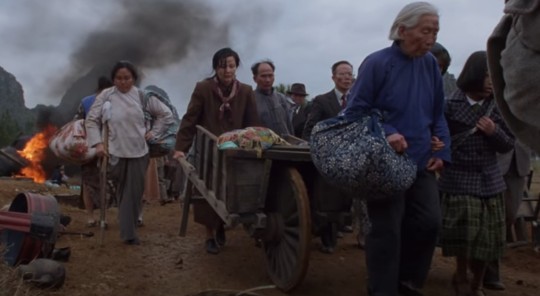
0 notes
Text
- Post 6: An Mei and Rose Hsu -
After losing her own mother in more ways than one, An Mei makes it her duty to ensure her daughter Rose knows her worth.
"You're just like my mother, never know your worth until too late." - An Mei
An Mei had a good, normal life with her family in China until her father passed away. When her mother goes to the temple to honor him she meets a rich man named Wu Tsing and his wife.
Wu Tsing's wife tricks An Mei's mother into coming home with them to break up the long journey. In the night, Wu Tsing forces himself on her, shaming her and making her break her vows as a widow.
News of this reaches her in-laws to kick her out of the house immediately, separating her from An Mei and leaving her with nowhere to go but back to Wu Tsing's house to live as his concubine. They do not believe that she was innocent and a victim.
When An Mei's grandmother begins to decline in health, An Mei's mother returns to nurse her. She makes a traditional soup that includes her own blood, which is believed to restore her mother-in-law's spirit. She dies anyway, and although An Mei's mother made an incredibly meaningful gesture, she is once again removed from the house.
This time An Mei refuses to stay behind and goes with her mother to live with Wu Tsing. She learns that her mother is Wu Tsing's fourth wife, and is treated poorly by him and the other wives, especially Second Wife.
An Mei discovers that Wu Tsing's only son, whom Second Wife claimed as her own, was really her mother's child that she conceived the night she first stayed at Wu Tsing's house. An Mei's mother does not fight this because she wants to survive to see her daughter again.
When An Mei's mother finds out that her daughter knows the full story, she is so ashamed of her complacency and bringing her into this awful home that she takes her own life.
An Mei curses Wu Tsing and his family for what they did to her mother. She swears that her mother will haunt them unless Wu Tsing honors her as his first and only wife, accepts that his son was hers and not Second Wife's, and honors the both of them as his true and only children.
She leaves China when she is older, remarries in America, and has a daughter named Rose. She hopes that Rose will be independent and fight for what she deserves.
"It's not your fault. None of it. I was the one that told you that my love wasn't good enough, that your love was worth more than mine. I was so full of shit!" - Rose
Rose meets a man named Ted in college. He grew up very rich because of his parent's successful businesses, and Rose is afraid that he will think she's only going after him for his money. He appreciates her for her honest concern, and they start dating.
When Rose meets his parents for the first time his mother corners her, and warns her that she is not the type of woman that Ted would be expected to marry. Coming from a rich white background, she tells Rose that if she continues with Ted it will damage his reputation.
Ted is outraged when he hears this, and although they haven't been together for long, he tells his mother that he loves Rose deeply and will not tolerate the racist idealogy that she is inflicting on Rose. They get married soon after, and have a daughter named Jennifer.
Rose does her absolute best to be a dutiful wife to make sure she doesn't embarass Ted. She never expresses her own needs or wants, only caring about what's best for Ted. He doesn't know how to handle this and begins to lose feelings for her, because he doesn't think there's any passion anymore.
They file for divorce even though they both secretly still love and care for each other. An Mei wants to know what Rose is going to ask for once they start dividing property. Rose doesn't understand what An Mei wants her to take, feeling unentitled to anything they own because Ted paid for most if not all of it.
After An Mei tells Rose her and her mother's story, she implores Rose to consider her own self worth and not back down. She knows that Rose has belittled herself in order to meet the traditional Chinese standards of a good, quiet wife.
Rose decides to confront Ted about this and demand that she gets what she deserves in the divorce settlements. This makes Ted realize that the woman he fell in love with is still there, and that they can save their marriage.
The divorce is cancelled, and Rose and Ted stay together.
"She would rather kill her own weak spirit, so that she could give me a stronger one." - An Mei

1 note
·
View note
Text
- Post 5: Ying Ying and Lena St. Clair -
Ying Ying experiences incredible loss during her life in China, and she wishes more than anything to prevent her daughter Lena from going down the same path.
"Do you know what you want? I mean... from him? Then tell him now. Leave this lopsided house. Do not come back until he gives you these things. Losing him does not matter. It is you who will be found, and cherished." - Ying Ying
Ying Ying falls in love with a man in China when she is only 16 years old. He is charming and romantic, taking her out on fancy dinner dates and showering her with affection.
When they marry and she has his son, she realizes that she is not the only one who has his affection. He openly cheats on her with several different women.
One night he comes home several hours late for dinner with an escort. When she asks who Ying Ying is, he tells her she's just another whore. He screams at Ying Ying, calling her disgusting and a disappointment before shoving her to the ground. Ying Ying breaks a plate and threatens to kill him with a glass shard, but he laughs and walks away with the other woman.
In her rage, Ying Ying feels that the only way to get back at her husband is to kill their child, which is the one thing that brings him honor. She drowns the baby before snapping out of her episode, immediately regretting it.
She suffered from Post Traumatic Stress Disorder because of the abuse and her own actions and frequently went into periods of disassociation and silence.
She remarries upon moving to the United States and has a daughter named Lena, who took care of her during her depressive episodes. She joins the Joy Luck Club in hopes that it will bring her some peace.
Ying Ying says that because she lost her spirit when she killed her child, she had none left to give to Lena, who was timid and overly tolerant to others who mistreated her.
"I just think that we need to change things. We need to think about what this marriage is based on, not this balance sheet." - Lena
Lena ends up in a cold, loveless marriage. Her husband Harold convinces her to comply with his financial system that ensures "equality". Everything they pay for is split 50-50, even their dinner bills when he orders a three course meal and she only has a salad.
She feels like a financial burden, not a wife. When she expresses this to Harold he makes her feel like she's overreacting.
Ying Ying confronts Lena and tells her that she needs to assert herself and make it clear that she deserves to be treated like a beloved partner, not an investment or a number. She is afraid that Lena will stay trapped in a relationship where she is not valued or honored, just like her own past marriage.
She vows to not let Lena repeat the mistake she made in her own marriage, and gives all the spirit that she has left in her to Lena so that she may free herself from her own mental cage with Harold.
Lena takes her mother's advice to heart and divorces Harold before finding a man named Ken who treats her with love and respect. Lena learns to make her wants and needs known in her new relationship with Ken.
"I am waiting like a tiger in the trees, now ready to leap out and cut her spirit loose." - Ying Ying
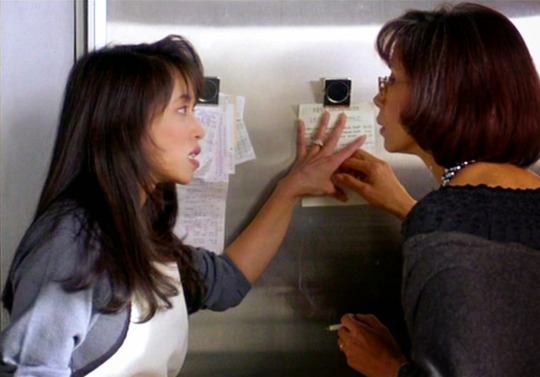
1 note
·
View note
Text
- Post 4: Lindo and Waverly Jong -
Lindo Jong and her daughter Waverly are two confident and charismatic women. They are both in frequent conflict with each other due to their opposite ideals and difficult relationships with their own mothers.
"I was only thinking about my mother. How much I wanted to be like her... She told me all the hopes she had for me - words I will never forget." - Lindo
Lindo begins her story by explaining the abandonment she faced by her mother, starting at the age of four, when she was promised by a matchmaker to the son of a woman named Huang Tai Tai.
She continued to live with her mother and her siblings until she turned 15, but her mother acted like Lindo did not belong to her anymore, and only mothered her by giving her advice on how to be the perfect feminine wife.
A lot of beauty standards and gender roles were enforced on Lindo from a very young age by her mother, who taught her how to eat like a proper lady and keep her appearance in order.
Her family then moves south without her, leaving her in the custody of Huang Tai Tai and never seeing her again. Lindo's mother is obviously upset about this, but feels it will be better for Lindo than staying with the family who is poor and struggling.
Lindo is married to Huang Tai Tai's son, who she does not meet or even get to look at until her wedding night. She's terrified that her new husband will be someone mean or old, but to her surprise, he is a child no older than herself. He is extremely immature, and makes her sleep on the floor.
When Lindo takes too long to produce a son, she is beaten and verbally assaulted by Huang Tai Tai, whom she tries to honor and care for. Eventually she makes an effort to escape, claiming that she saw the ancestors in her dream and they told her she was the wrong match for her husband, and that if the marriage was not annulled immediately he would die.
Huang Tai Tai and her family believe Lindo's lie, and she is freed. She moves to America, remarries, has Waverly and a son, and joins the Joy Luck Club.
Lindo also holds Waverly to high standards, repeating the expectations that her own mother held for her before they lost each other.
She searches for any information on Suyuan's lost daughters, hoping that her own mother would have done the same for her.
"You don't know the power you have over me. One word from you, one look, and I'm four years old again crying myself to sleep. Because I nothing I do... can ever, ever please you." - Waverly
Waverly takes on a burden similar to June's in her childhood when her mother makes her study to become a chess master.
She eventually gets tired of chess when she realizes that her mother is using her success to brag to other women in the community. They fight, and she vows to never play again.
Lindo gives Waverly the silent treatment and pretends not to care what Waverly does anymore, showing a glimpse of the neglect she faced as a child in the way she parents her own daughter.
After some time Waverly changes her mind and wants to play again, but she's lost her confidence and loses a match, deciding she will truly never play chess again.
Waverly grows up feeling like nothing she does will ever make her mother proud, including her first marriage to a Chinese man and having her own daughter, Shoshana.
She takes out these feelings of inadequacy on June through their childhood rivalry that continues into adulthood, when she criticizes a piece of writing June did for Waverly's company.
When she divorces her first husband and starts dating Rich, a white man, she is nervous that her mother will disapprove of him, even though she really loves him and wants to marry him.
Waverly and Rich are eventually engaged, and during an appointment at the hair salon where she takes Lindo to get her hair done for the wedding, they come to terms with each other and have a conversation similar to June and Suyuan's. Lindo tells Waverly that she actually really likes Rich, and Waverly tells Lindo how much her good opinion matters to her.
"My mom always does this. Whatever I say, whatever I think, whatever I do... she always has the perfect countermove." - Waverly
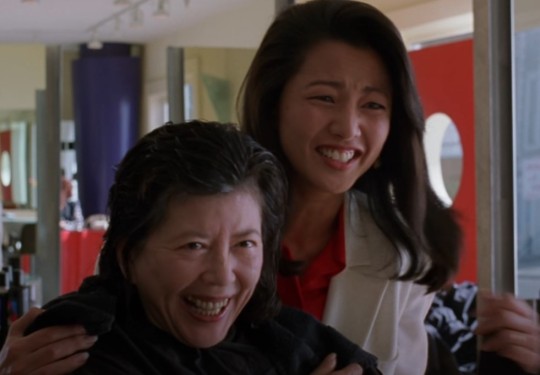
0 notes
Text
- Post 3: Suyuan and June Woo -
Suyuan and June Woo are the two main women featured in The Joy Luck Club. Here's a little bit about their stories:
"I see you." - Suyuan
The movie begins with a parable that Suyuan had told June when she was little about a woman who bought a swan in Shanghai. The swan was really a duck who had stretched its neck too far, hoping to become a goose. She tells the swan while they sail to America that if she has a daughter in the future, she hopes she will be loved for who she is - not who she ends up marrying. When they make it to the United States the immigration officers take the swan from her, leaving her only a feather. The woman vows to tell the daughter that even though the feather may not look like much, it has a great meaning.
Suyuan Woo was living in China with her husband and their two twin baby daughters when World War II began, and her husband had to leave them to join the military.
She's forced to relocate to Chungking, where her husband is waiting for her. During the journey she contracts dysentary and is struggling to survive and care for her babies on her own.
Once she realizes that she will not be able to carry on much longer, she decides it would be in her daughter's best interest if she left them with all of her material belongings and a note asking anyone who finds them to care for them, before walking away to die to avoid giving them bad luck. She is heartbroken, but she does not think she will live much longer.
Suyuan is rescued by someone and hospitalized, but it is too late to find her daughters again. Some time later she flees the war in China, moving to the United States. She remarries and has June, her third daughter. She also forms the Joy Luck Club with three other Chinese immigrant women that she met at church.
She holds June to high standards, wanting her to be successful and accomplished as a first generation American. This causes some strain in their relationship.
Towards the end of her life she finally has a conversation with June in which June expresses her feelings of inadequecy, and Suyuan reassures her that she will always be enough exactly as she is.
Eventually Suyuan passes away from aneurysm, leaving an empty space in the Joy Luck Club that June feels obligated to fill.
"Well, it hurts. Because every time you hoped for something I couldn't deliver, it hurt!" - June
June is raised with great expectations, which is commonly felt by children of immigrant parents. She is forced to take piano lessons by her mother in order to compete with auntie Lindo's daughter Waverly.
This childhood rivalry with Waverly stresses June out and makes her begin to resent her mother's concept of the "ideal Chinese daughter" that she enforces on June.
During a piano recital June cracks under the pressure and ruins her performance, and hopes that she will never be expected to play the piano again. However, her mom is persistant, and makes her keep practicing despite the setback.
When Suyuan dies, auntie Lindo makes contact with her two lost daughters who are revealed to have survived the war. She encourages June to go and visit them in China to tell them all about their mother, who they do not know has died.
June agrees, and she brings old pictures of her mother, some of her jewelry and belongings, and the swan feather mentioned at the beginning of the movie.
When she finally meets her two long-lost sisters, she expresses her grief over not being able to bring her mother with her, but ensures them that they were very loved by Suyuan and never forgotten.
The sisters pull her into a tight hug, crying and celebrating being able to at least meet their little sister.
"A mother can never give up hope for her own children, never! But she never did. On the day you were born, she transfer all of her hope to you..." - Canning Woo (June's father)
In Suyuan and June's relationship we can see how war and political conflict can alter the lives of many people, forcing them to leave their home countries, and how that affects future generations of immigrants. I'll be going into this a bit more in a later post!

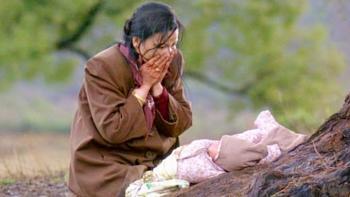
0 notes
Text
- Post 2: Film Synopsis -
One more spoiler warning before I go into the plot summary!
"This feather may look worthless, but it comes from afar and it carries with it all my good intentions." - Suyuan Woo
The story focuses on the lives of four Chinese immigrant women now living in San Francisco in the 1990's with each of their daughters.
June Woo, the first daughter we are introduced to, is having a going-away party before she leaves to visit China for the first time in her life. Her mother's three friends, known as her "aunties", are there with their daughters to wish her well.
During this party we see what remains of the Joy Luck Club, a mahjong group that was formed by June's mom Suyuan in the 1960's as a way of getting to know the three other immigrant women and spend time together.
Each of the three women - Lindo, Ying Ying, and An Mei - are given the chance to tell the story of their lives in China, and what caused them to come to America.
In between the mothers' stories we also hear the stories of their three daughters - Waverly, Lena, and Rose - and how their mothers' experiences as Chinese immigrants has shaped their own lives as the next generation.
All of the women share stories of great resiliency as they face war, neglect, abuse, grief, and self-esteem from their lives both in China and in the United States.
It's clear that each of the mother-daughter pairs have strong similarities in their own stories, with parallels between what the mothers experience in China and how that affects the way they treat their daughters.
Next up we'll be looking at the four mother-daughter pairs, their individual stories, and how they relate to one another!

0 notes
Text
- Post 1: About the Film -
For my project I chose to watch and analyze the film The Joy Luck Club! First, let me provide some background information for you...:
The Joy Luck Club was based off of a novel of the same name, written by author Amy Tan and published in 1989.
Amy Tan is a first generation Chinese-American that was born to immigrant parents in 1952.
She wrote The Joy Luck Club as a way of better understanding her relationship with her own mother.
After the successful publication of her novel, she was offered a film deal. The film released in 1993, just four years after the book!
Amy Tan worked with writer Ron Bass and Wayne Wang to create a faithful film adaptation of the beloved novel.
The film received several award nominations, won the Artios Award for Best Casting in a Feature Film in 1994, and was inducted into the Library of Congress's National Film Preservation Registry in 2020 for outstanding cultural importance.
It's been announced that a sequal project is already in the works, meaning in a short time we will see the main characters return with another generation added to the story!
In my next post I'll be examining the main plot of the movie, so please be aware of potential spoilers if you have not already seen it.

9 notes
·
View notes